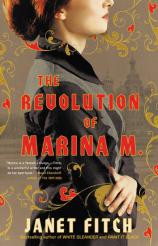The Revolution of Marina M.
Review
The Revolution of Marina M.
“Poets are the spies of the world, and every poem is a code.”
Marina Dmitrievna Makarova is a poet, and quite a good one --- good enough to have her first collection published. Arranged on a table in her Petrograd home, the books will be given as parting gifts to her parents’ guests when they leave the New Year’s Eve party later on. Marina is a romantic, a bright wordsmith destined for university, and an obsessive observer of all that goes on around her. She’s enamored of three things in particular: poetry, whether it’s her own or that of Russia’s famed writers; the hope of political change in her beloved country; and Kolya Shurov, her older brother’s friend and fellow soldier.
Kolya finally notices beautiful red-haired Marina at the party. He has brought a letter from her brother Volodya at the front, where he is to return himself. To Marina’s delight, Kolya also has brought her a gift: an enameled bracelet, along with secret kisses in the cloakroom. She has admired him from afar for years, and it seems that he finally has taken notice of her after all. Intoxicating, exciting Kolya has turned his attention to his best friend’s younger sister.
"Fitch writes about Russia and its people like a Russian would, and Marina embodies the best and the most illustrative of that country."
However, this is a book about Russians, not a simple love story, and Marina’s story doesn’t end there. Life and the war beckon, and Kolya must return to the front, and Marina to school. But the country is changing. With the war requiring so much in the way of provisions for the soldiers, food is becoming elusive in the cities, unless one is part of the bourgeoisie or the intelligentsia, like Marina’s father. Her family always has enough food to eat, elegant clothes to wear, and sparkling parties with intelligent conversation among the guests. This life is mostly unimaginable by Russia’s lower classes --- and what they can imagine, they deeply resent. The tsar seems enormously disconnected from the suffering of his people. And the 20th century will bring with it the change that the philosophers and politicals hope for. But, like Marina, they can’t conceive of the pains that the childbirth of the eventual revolution will deliver.
Drawn more and more into revolutionary thinking by her friend, Varvara, Marina romantically imagines a better life for Russia. She begins to notice the divide between the classes. She volunteers at a hospital for wounded soldiers, writing letters for illiterate men to their sweethearts and wives. She walks past bread lines, which are growing in length and desperation. Her love for Kolya, who has returned to Petrograd for some supposed army business, becomes a defining force in her life. He warns her of what is to come, the actual revolution that will explode her romantic notions of change. He tells her to watch the soldiers, for as the soldiers go (and as their loyalty shifts), so will the country. And then he leaves again for his regiment.
Innocent, romantic Marina is about to experience the upheaval that her own country is entering. She gazes around her beloved Petrograd and pours out poems about the working class, the strikes and marches, and the women. Her intense observation helps her to perceive some of what is about to happen, but her sheltered upbringing and lack of life experience prepare her in no way for the realities to come, either in her nation or in her own life. For ahead of Marina are love and passion, exhilarating poetry, captivity and degradation, betrayal and strength. Like Russia, she will experience upheaval and change in ways she cannot imagine. But like Russia, she will stand and persevere. And she will record in poetry all that she sees in secret.
Janet Fitch fell in love with Russia as a seventh grader, when she was looking for something to read other than the simple stories written especially for young American teens. Her father gave her Dostoyevsky’s CRIME AND PUNISHMENT, and her lifelong love for Russia and all things Russian began. Fitch writes about Russia and its people like a Russian would, and Marina embodies the best and the most illustrative of that country. She is deep, mystical and beautiful --- a lover of her country and its people, understanding that suffering will come but absolutely determined to persevere through it. She rises, falls and rises again; and the reader watches a self-focused, immature young woman grow, despite --- or perhaps because of --- her struggles.
Like all good Russian literature, THE REVOLUTION OF MARINA M. is long (800 pages, to be exact). But I promise that when you reach the end, you’re going to be looking for the second book about Marina’s life, which Fitch is currently writing. It can’t come soon enough for me.
Reviewed by Melanie Reynolds on January 5, 2018
The Revolution of Marina M.
- Publication Date: November 6, 2018
- Genres: Fiction, Historical Fiction
- Paperback: 816 pages
- Publisher: Back Bay Books
- ISBN-10: 0316022071
- ISBN-13: 9780316022071




